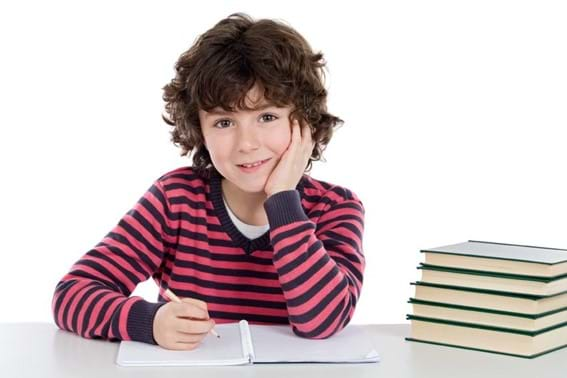
Is Your Child Gifted?

Written by: Marielle Potvin
Genius, whiz kid, gifted, talented... these are several of the terms used to describe a child’s exceptional intelligence or giftedness.
However, giftedness is rather misunderstood by most adults, even by teachers. As proof, more than half of gifted children are never recognized as such, even by the time they finish high school. This situation leaves them without the support that would allow them to develop and reach their full potential.
If your child seems particularly bright to you, this blog article will help you recognize the signs giftedness and explain the different methods to help guide a child with a high intellectual potential.
First off, what are the signs of giftedness?
1. In general, gifted children can be recognized due to the significant difference in their level of emotional development versus their intellectual development. For example: a gifted three-year-old boy may consider existential questions such as the meaning of life, but display the normal reaction of a child his age by throwing a tantrum when he’s been crossed.
Another characteristic is the important gap between these children’s intellectual development and that of their motor skill. For example: a gifted child may learn to read before starting school (sometimes without help), but struggle with fine motor skills (trouble using a pencil or scissors, taking part in arts and crafts, etc.).
One is also astounded by this children’s attention span, as much by its intensity than by its duration. Their vocabulary is refined, beyond the established standards for children of the same age. If momentarily interested in a subject, they may come close to making an obsession of it. Ancient Egypt, dinosaurs or astronomy may be preferred subjects for a gifted child of three or four years. You can also recognize these children by their extreme sensitivity, expanded moral awareness, and obviously, their perfectionism.
2. Most of the time, gifted children have a solitary nature; they sense their differences without being able to express this feeling and experience unease as a result. Furthermore, if they cannot understand their intellectual differences, they will have difficulty in seeing them as positive and can develop low self esteem.
These children fear themselves, their nature, the consequences of their thoughts, and the intensity of their emotions. As they are overly sensitive, they are prone to somatization when faced with incomprehension or difficulties. And since these children are often perceived as odd by their age peers, they suffer without being able to find a logical explanation.
Socially, their adaptation poses significant challenges, even as early as infancy. As these children our out of step with their age peers, they often have problems relating to other children or finding common interests.
If in the presence of an injustice, the gifted child will react strongly, as he loathes inequality and maliciousness. This sense of empathy sometimes leads to an inclination towards professions in the fields of healthcare or justice.
Intellectually, gifted children are analytical thinkers; they are capable of taking things apart in their mind and seeing endless possibilities. Their ideas spawn a multitude of other ideas from a common source, creating rich intellectual thought, but not necessarily focussed on the initial notion.
As a result of their exceptional curiosity and their craving for knowledge, these children require constant stimulation from their entourage, each question and answer setting off a new series of enquiries. Despite their many questions, these children also have methods of acquiring knowledge on their own. Furthermore, they have an astonishing memory.
Another impressive intellectual capacity is that gifted children have the ability to instinctively identify and replicate concepts or strategies to solve problems, which allows them to generalize such strategies and apply them to different situations.
3. Multi-tasking comes easily to gifted children. They are quite capable of following a lecture or having a conversation while doing something else, and to the surprise of their entourage, not miss a single thing!
We also know that they have great difficulty with failure, are sensitive to the harmony (musical or aesthetic, for example), and frequently have a unique sense of humor, often imprinted with sarcasm or irony.
Finally, it can be noted that gifted children have difficulty making decisions when faced with a problem that cannot be solved logically, such as emotional problems.
What you can do as a parent
The parents of gifted children are rarely overly protective, demanding or enthralled when it comes to their children. They are often the first to be surprised by their children’s unique development.
The attitude parents adopts towards their child's differences can make a significant difference in the way this child lives and perceives his or her giftedness, one that can make the general experience much more fulfilling.
Here are a few tips to this end:
- Show an interest in what your child is reading;
- Encourage originality. Motive your child to create projects;
- Encourage your child to ask questions;
- Stimulate your child’s creative thinking and problem solving skills;
- Encourage his interest in different activities;
- Ensure your child has free moments to simply reflect and appreciate the world around him.
- Try to be a true companion to your child. Explore and take part in each other’s thoughts. Your child needs your presence even more as his social adaptation can be testing. Speak to your child about his giftedness and help him get to know himself better.
One of the challenges inherent in being the parent of a gifted child is the feeling of isolation the situation can create when it comes to parent-teacher exchanges regarding the child. These discussions can sometime be trying, to the extent that some parents prefer to abandon the idea of maintaining ties with their child’s teacher. But it is important that this relationship exist as a bridge to create a better mutual understanding of the gifted child’s everyday reality.
Fortunately, associations, documentation and communication regarding this subject are multiplying, favouring a better circulation of information regarding this matter.
Tune in for Marielle Potvin's interview on gifted children on February 4, 2014 on Libre-service on MaTV.
Useful links:
http://www.ourkids.net/gifted-kids-schools-quebec.php
http://www.mensacanada.org/gifted-youth/parent-resources/
Good reads:
A Parent’s Guide to Gifted Children Dr. James Webb, Janet Gore, Dr. Edward Amend & Arlene De Vries
You Know Your Child is Gifted When... A beginners Guide to Life on the Bright Side | Judy Galbraith
Parenting Gifted Kids: Tips for Raising Happy and Successful Children | Dr.Jim Delisle

Marielle Potvin, Remedial Teacher


